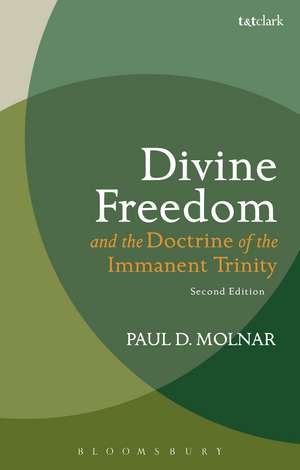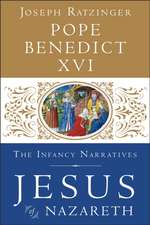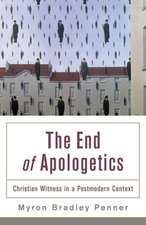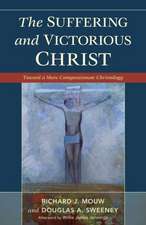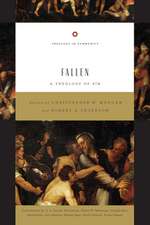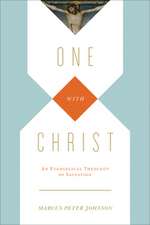Divine Freedom and the Doctrine of the Immanent Trinity: In Dialogue with Karl Barth and Contemporary Theology
Autor Paul D. Molnaren Limba Engleză Paperback – 22 feb 2017
Preț: 272.81 lei
Preț vechi: 325.86 lei
-16% Nou
Puncte Express: 409
Preț estimativ în valută:
52.21€ • 54.31$ • 43.10£
52.21€ • 54.31$ • 43.10£
Carte disponibilă
Livrare economică 22 martie-05 aprilie
Preluare comenzi: 021 569.72.76
Specificații
ISBN-13: 9780567656797
ISBN-10: 0567656799
Pagini: 544
Dimensiuni: 138 x 216 x 48 mm
Greutate: 0.79 kg
Ediția:2
Editura: Bloomsbury Publishing
Colecția T&T Clark
Locul publicării:London, United Kingdom
ISBN-10: 0567656799
Pagini: 544
Dimensiuni: 138 x 216 x 48 mm
Greutate: 0.79 kg
Ediția:2
Editura: Bloomsbury Publishing
Colecția T&T Clark
Locul publicării:London, United Kingdom
Caracteristici
Contains revised and up to date material which brings this edition to the cutting edge of contemporary theological discussion
Notă biografică
Paul D. Molnar is Professor of Systematic Theology at St. John's University in New York, USA. He has published numerous articles in the world's leading journals together with four other books including: Thomas F. Torrance: Theologian of the Trinity (2009).
Cuprins
Preface Acknowledgements Abbreviations New Introduction by Paul D. Molnar1. The Purpose of a Doctrine of the Immanent Trinity and Its Neglect Today 2. Christology and the Trinity: Some Dogmatic Implications of Barth's Rejection of Ebionite and Docetic Christology 3. Christology, Resurrection, Election and the Trinity: The Place of the Logos Asarkos in Contemporary Theology 4. Reconsidering Divine Freedom5. Experience and the Theology of the Trinity: How Karl Rahner's Method Affects His Understanding of Revelation, Grace and the Trinity 6. Can a Metaphysical Principle of Relationality Be Substituted for the Relations of the Immanent Trinity? Karl Barth and the Current Discussion 7. Karl Rahner and Thomas T. Torrance: God's Self-Communication in Christ with Special Emphasis on Interpreting Christ's Resurrection 8. The Function of the Trinity in Jurgen Moltmann's Ecological Doctrine of Creation 9. Persons in Communion and God as the Mystery of the World: Alan Torrance, Eberhard Jungel and the Doctrine of the Immanent Trinity 10. The Promise of Trinitarian Theology: Colin Gunton, Karl Barth and the Doctrine of the Immanent Trinity 11. Conclusion Appendix Selected Bibliography Index of Names Index of Subjects
Recenzii
The first edition of this book in 2002 was a now classic account of the freedom of God as understood in the doctrine of the immanent Trinity. The second edition is not just a reprint but a thorough revision with a re-configured preface, a new chapter on Divine Freedom, and many revisions and updatings to material on Jenson, Moltmann, Pannenberg, Jüngel and Schleiermacher. In clarity, power and effectiveness, it takes its place at the heart of contemporary discussion of the doctrine of God. I thoroughly recommend this new edition.
This new edition will be of interest to those familiar with the first edition, as well as scholars new to Molnar's work with interests in Barth, Torrance, and in contemporary discussions in the doctrine of God and the Trinity.
The re-issue of this weighty tome in revised and expanded form is welcome news indeed. It had already established itself as one of the two or three most important English-language treatises on the doctrine of the Trinity in recent theology. In its new form it includes rich and detailed discussions of theologians like Moltmann, Pannenberg and Jenson, not to mention McCormack and his followers, that are sure to generate interest. Molnar is one of the most distinguished interpreters of the Trinity in our time. His powerful book is indispensable for anyone interested in these questions.
The first edition of Paul Molnar's Divine Freedom and the Doctrine of the Immanent Trinity was one of the most significant books to appear in trinitarian theology in a generation. In this new edition, Professor Molnar has enhanced the case made in that study, demonstrating with even greater depth, clarity and nuance why it is that the doctrine of the essential Trinity must hold material primacy if Christian theology is to confess the God of the gospel well. This is an even more powerful book than its predecessor, enriched by further engagement with contemporary debates on freedom, election and history. The central argument concerning God's antecedent plenitude in himself remains of crucial importance for theology today. More than ever: Take, read!
Paul Molnar in his Divine Freedom and the Doctrine of the Immanent Trinity: In Dialogue with Karl Barth and Contemporary Theology illumines in refreshingly clear prose the errors in method in many contemporary theologies by his resolute insistence that God is the only fit witness to Who He Is. Molnar adroitly opens for the reader the understanding that theology to be truly theological must start from and be normed by what is unfolded in the doctrine of the Immanent Trinity, i.e., an account of the eternal life of the Father-Son-Holy Spirit. Therein theology is poised to hear the divine direction for our creaturely lives, attitudes and actions.Molnar, critical of theologies which proceed from a centre in ourselves and our own experiences, is yet careful and judicious in his description of these various contemporary Roman Catholic and Protestant theologies. This book is a bright beacon bringing clarity to current theological discussion.
In the face of several challenges, Paul Molnar offers us a robust defence of the doctrine of the immanent Trinity. With his characteristically clear and robust style he outlines the intellectual and existential reasons for maintaining the classical position. This new expanded edition should be widely studies and cited.
This new edition will be of interest to those familiar with the first edition, as well as scholars new to Molnar's work with interests in Barth, Torrance, and in contemporary discussions in the doctrine of God and the Trinity.
The re-issue of this weighty tome in revised and expanded form is welcome news indeed. It had already established itself as one of the two or three most important English-language treatises on the doctrine of the Trinity in recent theology. In its new form it includes rich and detailed discussions of theologians like Moltmann, Pannenberg and Jenson, not to mention McCormack and his followers, that are sure to generate interest. Molnar is one of the most distinguished interpreters of the Trinity in our time. His powerful book is indispensable for anyone interested in these questions.
The first edition of Paul Molnar's Divine Freedom and the Doctrine of the Immanent Trinity was one of the most significant books to appear in trinitarian theology in a generation. In this new edition, Professor Molnar has enhanced the case made in that study, demonstrating with even greater depth, clarity and nuance why it is that the doctrine of the essential Trinity must hold material primacy if Christian theology is to confess the God of the gospel well. This is an even more powerful book than its predecessor, enriched by further engagement with contemporary debates on freedom, election and history. The central argument concerning God's antecedent plenitude in himself remains of crucial importance for theology today. More than ever: Take, read!
Paul Molnar in his Divine Freedom and the Doctrine of the Immanent Trinity: In Dialogue with Karl Barth and Contemporary Theology illumines in refreshingly clear prose the errors in method in many contemporary theologies by his resolute insistence that God is the only fit witness to Who He Is. Molnar adroitly opens for the reader the understanding that theology to be truly theological must start from and be normed by what is unfolded in the doctrine of the Immanent Trinity, i.e., an account of the eternal life of the Father-Son-Holy Spirit. Therein theology is poised to hear the divine direction for our creaturely lives, attitudes and actions.Molnar, critical of theologies which proceed from a centre in ourselves and our own experiences, is yet careful and judicious in his description of these various contemporary Roman Catholic and Protestant theologies. This book is a bright beacon bringing clarity to current theological discussion.
In the face of several challenges, Paul Molnar offers us a robust defence of the doctrine of the immanent Trinity. With his characteristically clear and robust style he outlines the intellectual and existential reasons for maintaining the classical position. This new expanded edition should be widely studies and cited.
